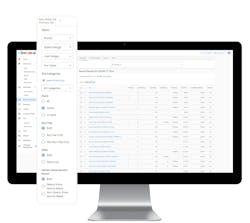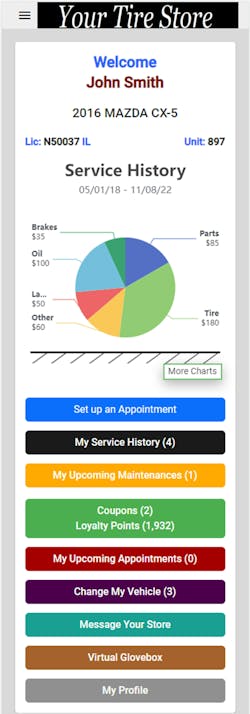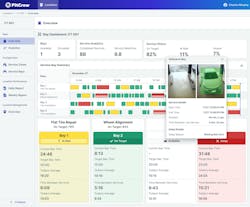The utilization of Artificial Intelligence (AI) has become more common in various retail applications over the last few years — and tire retailing is no different. According to a number of companies that offer AI solutions for tire dealerships, more and more tire dealerships are taking advantage of the benefits that AI has to offer.
Officials at these companies break down how tire dealers are currently using AI tools and the future of AI in the tire retail segment in this MTD exclusive.
MTD: Are more tire dealerships using AI products and tools?
Lukas Kinigadner, co-CEO of Anyline Inc.: Absolutely. We’re seeing a clear uptick in AI adoption across the tire industry. Dealerships of all sizes are looking for ways to modernize without overhauling their entire operation and AI offers exactly that: smarter, faster ways to do the same work with greater accuracy and consistency. Whether it’s inspections, inventory decisions or service recommendations, AI tools are helping dealers reduce manual effort, deliver better service and stay competitive in a rapidly digitizing market.
Todd Richardson, CEO and president at Atrium Solutions Inc. and CEO at In Motion Brands: Absolutely — 100%. While we're still in the early days of full-scale adoption, the momentum is undeniable. Think back to when online ordering from tire and parts suppliers was first introduced. Initially, dealers had to be incentivized to use these platforms because the industry was skeptical of digital systems and preferred human interaction. AI today is in a similar place, but the pace of adoption is far faster, in line with the acceleration we’ve seen across all technology sectors.
Tire dealers are increasingly hungry for AI solutions because automation offers real answers to both long-standing industry pain points and emerging consumer demands. These include:
- Missed revenue opportunities due to unanswered calls or poor follow up;
- Labor shortages and overworked front-line staff;
- Rising customer expectations for speed, expertise and 24/7 availability;
- The high cost of traditional customer service models, and;
- Data-driven decision-making replacing gut-based management.
AI is not just a buzzword. It’s becoming a core pillar of operational efficiency and competitive advantage for tire dealerships.
Jeremiah Wilson, CEO, Convirza: Absolutely. We're seeing strong momentum as tire dealers adopt AI tools to compete more effectively and sell more. The adoption of AI tools in tire dealerships is not just a trend. It’s a strategic move toward using AI to make your day easier. With the increasing volume of customer interactions, especially phone calls and texts, (dealers are) turning to AI to ensure no opportunity is missed.
Steve Lee, co-founder and chief technical officer, Leverege: Absolutely. The tire service industry is undergoing rapid transformation and AI adoption is accelerating across the board, from national chains to independent shops and franchises. As operational margins tighten and customer expectations for speed and convenience grow, tire dealerships are turning to AI to stay competitive. What used to be a niche innovation is now quickly becoming a core part of how modern shops operate. From real-time bay intelligence to predictive maintenance and customer experience tools, AI is reshaping every aspect of the service lifecycle.
Linda Gray, CEO, Mastertech.ai: Yes. From our conversations with tire dealers and service centers, more and more businesses are incorporating AI tools and technology into their workflows. Many of them are proactively seeking out new AI tools to evaluate how they can enhance their business.
Ryan Louis, CEO, Revmo AI: From my seat at Revmo AI, the answer is a resounding yes. AI has moved from “interesting” to “inevitable” in the last 18 months. We’re seeing independent tire dealers and chains treat AI the way they treated websites 20 years ago: an unavoidable front door to the business. Most start small — after-hours call answering, simple appointment booking, etc. — but once they see the uptick in captured calls and ticket value, expansion is quick. In short, AI is becoming as essential to tire retail as an alignment rack and just as revenue-critical.
Ivan Ceraj, head of platform at TireTutor: Across automotive more broadly, we've seen AI being used to book appointments and chat bots being used to interact with customers. I think there's a lot of wide-open space here to provide the tire industry with solutions made specifically for them.
MTD: What are some other ways tire dealerships are currently using AI?
Kinigadner (Anyline): Today, many dealerships are using AI to digitize some of the most time-consuming and error-prone parts of their workflow. Tire inspections are a prime example. Instead of manually checking DOT codes or tread wear, AI-powered apps can now capture that information instantly using just a smartphone. In more advanced set-ups, AI insights are being integrated into point-of-sale systems, so technicians can offer timely recommendations or service bundles while the customer is still in the bay. It’s all about speed, precision and making smarter decisions in real time.
Richardson (Atrium, In Motion Brands): AI is reshaping nearly every aspect of the tire dealership, from customer-facing tasks to backend operations. Some of the most common and effective current uses include:
Front office support. Many tire dealers are shifting toward a hybrid customer service model, where AI supports the front desk team. AI voice and chat agents now assist with booking appointments, answering routine questions, collecting vehicle details and routing calls, which dramatically reduces the workload on service advisors and counter staff.
Emergency roadside service (ERS). Commercial tire dealers, especially those servicing fleets, are revolutionizing how they manage roadside breakdowns. AI-powered ERS platforms streamline dispatching, eliminating the manual back-and-forth and reducing dispatch times from 30 minutes to as little as 15 seconds.
Marketing automation. Any tire dealer handling marketing in-house is increasingly turning to AI tools for email automation, ad performance optimization, customer segmentation and predictive campaign targeting. These tools remove guesswork and drive a better ROI.
Business intelligence and planning. Dealers are leveraging AI-driven analytics to gain real-time insight into sales, service performance, technician efficiency and inventory management. These tools allow business owners to make data-backed decisions quickly and confidently.
Wilson (Convirza): (AI can) identify missed opportunities from phone calls where potential leads weren’t properly handled or followed up; monitor and track agent performance by analyzing call content, tone, responsiveness and adherence to scripts; and AI voice agents answer calls 24/7 and even schedule appointments directly into shop calendars.
Jim Krakower, director of system development, JMK Computerized Tire Dealer Information System Inc.: Back-office efficiency automates mundane tasks and eliminates typos. (AI can help) automate processing daily tasks of just-in-time parts/tire invoices from vendors. It can also seamlessly integrate all aspects of accounting with multi-corporation financial statements and state use tax to minimize manual entry. AI helps the sales counter automate quotes and fully integrate digital vehicle inspection (DVI) and direct alignment machine link. It could also incorporate predictive analytics for product/service recommendation or automated service reminder follow-up via text or email.
Shop organization benefits through bar code organization and multi-tiered schedules. Inventory control and forecasting benefits from harnessing staff’s smart phone/tablet for inventory control and bin assignment, graphical presentation and analytics review of multiple topics like inventory trends, use of optical character recognition to read the data of the just-in-time vendor supply paper invoices and more.
Lee (Leverege): AI is finding its way into virtually every part of tire service operations. Common uses include:
Service bay intelligence. AI systems ... monitor service bay utilization, detect bottlenecks and improve throughput in real time. This results in more efficient bay usage, enabling shops to complete more jobs per day without increasing staff, driving higher daily invoice counts and boosting overall revenue.
Wait time forecasting. AI trained in real-world service data provides accurate repair time estimates based on vehicle make, model and service type. This leads to improved scheduling, more accurate customer expectations and a smoother service experience, ultimately enhancing customer satisfaction and reducing complaints tied to unexpected delays.
Inventory management. AI models help optimize stock levels, reducing over-ordering while ensuring critical parts are always available.
Point-of-sale and CRM tools. Shops are integrating AI into their front-end systems to personalize customer recommendations, streamline check-ins and automate follow-ups and marketing.
Queue and staff optimization. Real-time monitoring helps managers rebalance technician workloads and service scheduling dynamically.
Gray (Mastertech.ai): Many dealerships are using AI for helping with phone answering and scheduling, which is a great use of the current AI technology.
Louis (Revmo AI): Today’s smartest dealers point AI at their biggest chokepoints: quoting, ordering and call overflow. A 24/7 voice agent answers every ring, pulls tire size from the plate or VIN, checks live inventory across local warehouses, quotes good-better-best options and books the job — all before the caller would have reached a human. Routine questions — hours, rotations, TPMS lights — are handled on the same call or by quick SMS follow-ups, freeing counter staff to focus on customers already in the bay. The result is faster first contact, fewer walkouts and a noticeably calmer showroom.
Ceraj (TireTutor): A great example is tire pricing, which can be incorporated into a larger point-of-sale platform. AI-based programmatic tire pricing takes in a huge number of different inputs and then programmatically calculates a price for the dealer, so they don't have to worry about doing math at the counter. It saves time and it ensures they can maintain margin at all times.
MTD: What future uses for Ai do you envision at tire dealerships?
Kinigadner (Anyline): We believe AI will become deeply embedded in every part of the tire service workflow, not just at the inspection stage. In the near future, we expect AI to handle everything from automated check-ins to real-time vehicle diagnostics, minimizing technician workload and maximizing efficiency. Another exciting frontier is technician training and knowledge. Imagine a built-in tire expert companion — powered by generative AI — that can answer any tire-related question, help interpret inspection results and even analyze photos for edge cases or damage. With AI, every technician can have expert-level guidance in their pocket.
As more of these tools are adopted, the volume and quality of AI-powered data will unlock smarter decision-making across the entire business, from operations to customer engagement. Predictive maintenance will also become more common, with AI flagging tire issues before they create a safety concern. And as electric vehicles become more mainstream, AI will play a role in linking tire health to battery performance and efficiency. Even pricing and customer communication will be influenced by AI, enabling more personalized service based on a vehicle’s actual condition and usage patterns. The possibilities are massive and very real.
Richardson (Atrium, In Motion Brands): Our stance is simple: the future is already here. It’s just not evenly distributed. Business owners must stop calling in their orders to the order desk and instead embrace the full capabilities of digital and AI technology. Looking ahead, we believe that AI and robotics will transform every job and function within a dealership. From autonomous mobile service units to fully integrated CRM platforms that manage customer lifecycles without human intervention, the opportunities are endless. However, the one constant is the human touch. As long as customers value genuine interactions and we can find people for those roles, there will always be a place for people in this industry. Dealerships that harness AI to handle the routine work will give their people the freedom to excel at what humans do best: connecting, solving and serving customers with genuine care.
Wilson (Convirza): Looking ahead, we see widespread adoption of AI voice agents. More shops are using AI to identify missed sales opportunities and provide better customer service.
Lee (Leverege): Looking ahead, AI will evolve from a passive observer to an active orchestrator of daily operations. Here are just a few high-impact use cases on the horizon:
AI co-pilots for shop managers. Real-time recommendations for technician assignments, upsell opportunities and customer queue rebalancing;
Integrated customer profiles across visits. AI will connect the dots between tire wear patterns, alignment history and service records to suggest proactive services, boosting safety and sales, and;
Automated service planning. AI will schedule appointments automatically based on historical demand, technician availability and even weather or local events.
The future of AI in tire service is predictive, personalized and proactive.
Gray (Mastertech.ai): I strongly believe that in the near future, AI will be integrated into every aspect of the workflow — not just in the tire dealer industry, but across most vertical industries and sectors. For tire dealers specifically, I see AI enhancing everything from front-end customer relations to scheduling, workload management, inventory optimization, service need analysis, personalized service recommendations and assisting technicians in completing jobs more efficiently.
Louis (Revmo AI): The next wave is predictive service orchestration. Machine-learning models will combine tread-depth scans, mileage data and driving patterns to predict the exact week a customer will need new tires. Your AI agent will then automatically text or call with a personalized quote, check the customer’s digital calendar for open windows and drop the appointment onto the shop’s schedule — no phone tag, no forgotten maintenance. It’s the same, just-show-up convenience ride-share apps have trained us to expect, applied to tire replacement and every follow-on service.
Ceraj (TireTutor): Tire forecasting and inventory management is a great use case that I think we'll see more of soon, taking a lot of inputs and helping a dealer understand what kinds of tires they should be ordering — and in what quantity — to maximize their potential revenue. For that to be successful, you really need access to a lot of data to train the model.
MTD: What’re some of the AI products you offer for independent tire dealerships and what are the features and benefits of those products?
Kinigadner (Anyline): At Anyline, we’ve developed two key solutions for the tire industry. The first is TireBuddy, our mobile inspection app designed specifically for independent tire dealers and service teams. It allows technicians to scan tire sidewalls, capture DOT codes, measure tread depth, detect visible damage and scan VINs, all using a standard smartphone. The entire inspection process takes less than a minute, requires no extra equipment and provides clear, AI-verified results that improve accuracy and build customer trust. TireBuddy was born directly from conversations with the market. We heard what independent dealers needed and we built it in record time. Seeing it in the hands of real technicians, getting incredible feedback from garages across the board, has been both validating and energizing. It’s proof that the right AI tools can make a real difference on the shop floor.
For larger service providers or enterprise customers with their own apps, we also offer the Anyline SDK — a powerful set of tools that can integrate directly into an existing workflow. This allows companies to embed our scanning and AI capabilities — including tire data, VIN recognition and barcode capture — into their own branded apps. It’s ideal for organizations that want full control, full flexibility and full scalability, whether across a region, a fleet or an entire dealership network.
Richardson (Atrium, In Motion Brands): We offer a suite of purpose-built AI tools specifically designed to help tire and auto repair businesses grow while reducing operational pressure:
- AI Service Advisor Agent lowers inbound call volume to service advisors and counter staff by 20% to 50% and ensures every call is answered and captured, while collecting more accurate, consistent and actionable customer information. It features appointment booking, multilingual support, customer detail collection, quote assistance and intelligent routing;
- AI Fleet ERS Platform automates fleet dispatch for emergency tire service. It features instant customer data intake, automated dispatching and fleet profile recognition, and;
- AI Call Center Agent replaces or supplements traditional call center services. The AI Call Center features natural voice conversations, appointment setting and multilingual support.
AI doesn’t replace people. It empowers your team, improves responsiveness and helps you deliver a stand-out customer experience. For tire dealers ready to compete in tomorrow’s market, the time to adopt AI is today.
Wilson (Convirza): Conversation analytics analyzes every call for lead quality, sales readiness and missed opportunities; Agent scoring and coaching automatically scores calls based on performance criteria, helping managers coach more effectively and ensure quality service; and AI Voice assistant (serves as a) virtual receptionist that answers, engages and books appointments — ideal for after-hours coverage or busy peak times.
Krakower (JMK Computerized TDIS Inc.): Collaboration of 10 goal-driven AI software modules:
- Service//SMART uses a QR coded vehicle sticker and customer's own smart phone for direct access to the vehicle service history and ability to make new appointments;
- J-Portal allows commercial/wholesale customers smart phone remote access to their service and payment history, with (the) ability to easily create new appointments, and many more options;
- J-Buzz PLUS automates two-way text/emails customer contact extrapolated from service history and sales counter vehicle follow up triggers;
- J-Doc PLUS (allows a dealership to) go paperless and store customer invoices, related parts vendor (information) digitally, to include handwritten notes/comments. It also loads just-in-time vendor invoices directly into the system via optical character recognition;
- Audit//TRAC validates just-in-time vendor supply invoices back to accounts payable accounting, inventory control, sales invoice cost assignment and vendor returns or cores tracking using optical character recognition technology.
- J-Tab fully integrates shops’ digital vehicle inspections (DVI) with extensive related features;
- Trac//SMART has advanced in-shop tracking of vehicle service process via extensive bar codes and keeps employees and customers up to date on vehicle status with extensive tracking of employee productivity and optional customer text messaging;
- J-Dash (is) an analytics platform and management advanced information tool with over 90 charts/graphs and extensive guidelines on inventory, employee tracking productivity;
- J-UPC harnesses your staff's smart phone or tablet for easy-track AI, an in-store (warehouse) smart device inventory tracking or control allowing dealers to repurpose staff's existing hardware to validate inventory on hand, and; J-Custom AI (creates) bespoke AI systems to dealer's exact operational requirements, supported by a deep talent pool based in four states and 50-plus years of extensive industry experience.
Lee (Leverege): Our flagship product for tire dealerships is PitCrew, an AI-based real-time service bay intelligence platform. It’s designed to turn service centers into high-efficiency, high-throughput operations. Key features include:
Real-time bay monitoring: Uses Vision AI to analyze live video feeds and track bay occupancy, vehicle make and model, machine and tool use and job status;
Predictive wait time forecasting: AI-trained on real service data provides accurate job time estimates to set realistic customer expectations, and;
Labor tracking and optimization: Monitors technician workflows, tracks time spent per service and highlights staffing inefficiencies. This helps shops ensure the right number of technicians are assigned at the right time, improving productivity and reducing idle labor costs.
Gray (Mastertech.ai): At Mastertech.ai we are building AI products to help advisors maximize service opportunities for every vehicle and increase ARO, while also assisting technicians in completing repairs more quickly, easily and safely.
Louis (Revmo AI): In short, Revmo’s suite turns every inbound interaction — calls, texts, promo redemptions — into a fully-tracked, revenue-generating workflow. The AI Voice Agent makes sure no call goes unanswered; the Conversation Analytics Center converts those calls into actionable insights and coaching; Smart Coupon Wallet Links close the loop by delivering perfectly-timed offers and measuring redemption; and Ignite Integrations drop all that data straight into the shop’s existing POS and CRM. The payoff is national-chain sophistication — higher booking rates, granular ROI visibility, and faster go-live — delivered on a pay-for-value value pricing model.
Revmo Voice Agent (provides) 24/7 conversational phone agent that answers every call, books service, sends SMS and upsell links. (It) captures missed revenue and frees counter staff.
Conversation Analytics Center (provides) live transcripts, intent tags (“tire quote” or “alignment”), booking-rate dashboards and coaching prompts. (It) improves close rates and proves marketing ROI.
Smart Coupon Wallet Links (has) AI choose the right offer, deliver via SMS/wallet and tracks redemption back to the call. (It) offers 17% to 20 % average redemption without blanket discounts.
Revmo Ignite Integrations (provides) plug-ins for TireMaster, Tekmetric, BayIQ, MaddenCo and open API. (It) goes live in less than two weeks, no rip-and-replace.
Ceraj (TireTutor): We have a number of solutions currently available to dealers and more in development. AI-enabled programmatic tire pricing is one where we are adding more and more AI powered insights all the time; we continuously update prices of over 300,000 SKUs based on many factors; and we allow dealers to adjust their pricing based on this data and their business strategy. We also have an AI agent that can take tire orders over the phone in both English and Spanish. It's specifically intended for larger dealers and helps reduce wait times and free up staff during busy times. Our analytics suite is powered by AI — not just providing dealers with the data, but helping dealers quickly interpret charts and uncover key insights. And finally, we have an algorithmic traffic acquisition product, which uses AI to maximize return on the dealer marketing investment, ensuring that they're paying for the right traffic at the right time.
About the Author
Madison Hartline
Associate Editor
Madison Hartline (Gehring) is the associate editor for Modern Tire Dealer and Motor Age. Since joining MTD after graduating from The Ohio State University in 2022, she has taken on the role of managing the brand’s social media strategy, producing podcast episodes and overseeing eNewsletter content.
Don't miss Hartline's next article. Sign up for MTD's newsletter.







